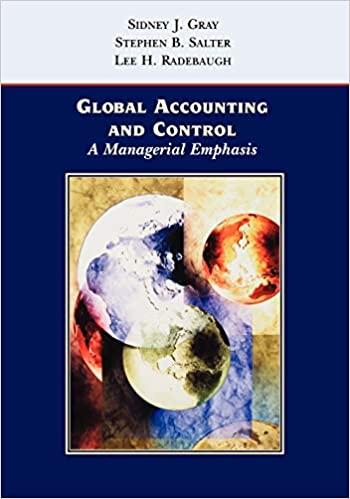The Barings desk on the trading floor is abandoned. The computer screens are dead. The little Union
Question:
The Barings desk on the trading floor is abandoned. The computer screens are dead. The little Union Jack that was sitting on one of the terminals a few days ago has mysteriously vanished. This little island of silence amid the hordes of roaring, gesticulating traders is a melancholy symbol of how the mighty have fallen—Barings, the old paragon of British investment banking, and Nick Leeson, the ambitious futures whiz from London who is being blamed for breaking the bank.
Barings, which was founded 232 years ago and helped finance the British Empire, is broke. Leeson, who spent his 28th birthday hiding out in Borneo last week, is in a German jail fighting extradition to Singapore. The global financial industry has been shaken, and questions are being asked about whether the breakdown of controls at Barings could happen elsewhere.
How did it come to this?
The first inklings came in September, when traders who follow the futures market noticed big bets being placed by Barings on the movements of the Nikkei average, the leading Japanese stock measure. Market-watchers began paying close attention to a tall, bespectacled trader and amateur soccer player named Nicholas William Leeson, who was doing extraordinarily big business in the futures pit at the Singapore International Monetary Exchange, the SIMEX.
Who was backing his multimillion-dollar gambles? “By December the speculation began to get feverish,” said Mike Kokalari, vice president of Paribas Capital Markets Ltd. in Tokyo. Knowing Barings to be a bank that plays the market for clients, rather than for itself, most traders assumed Leeson had netted a big customer. A senior futures executive in Singapore, who spoke off the record, ruefully recalls how envious he was and how he badgered his own traders to get a piece of Leeson’s action. In fact, as it later became shatteringly clear, there never was any client. Leeson was playing the futures market with Barings’ own money, and his wrong guesses had gutted the bank—by losing an estimated $1 billion. Initially the gamble seemed sound.
Leeson was using a complex system called “straddling,” based on the assumption that the 225-stock Nikkei index would stay steady and not stray far from the 19,000-point level.
Japan looked like it was pulling out of its long recession, and the Nikkei was stable. Moreover, Leeson had done well for Barings since he was posted to Singapore three years ago.
The Singapore futures executive said Leeson showed an impressive understanding of the Nikkei and the Japanese economy. But on Jan. 17, an earthquake struck the Japanese port of Kobe. Six days later, when damage estimates rocketed to $100 billion, the Nikkei plunged 1,054.73 points in a single day—its biggest drop in more than four years, Leeson doubled his bets—5,158 futures contracts in Osaka, Japan, on Jan. 25; 7,775 the next day; and by Feb. 21, Barings was holding 90,076 Nikkei futures in Osaka. Paribas, its nearest rival, had just 2,710.
Rather than cut his losses, Leeson piled more money into Nikkei futures, apparently believing he could move the index upward by sheer weight of trading. It moved, but not enough. In Singapore, traders who watched Leeson at the futures pit saw a man being driven deeper into a corner. As one of them observed, it is hard to take on an earthquake that has knocked out a Japanese commercial hub. The plasterer’s son from the housing projects of Watford, England, had created a monster that was about to devour him. The countdown to disaster was well along.
On Feb. 23—the day Barings says it first learned of the problem—Leeson and his 23-year-old wife left their fifth-floor condo, and Leeson drove over the bridge across the Johore Strait into Malaysia, reportedly in a white rented Mercedes. The apartment showed signs of a hurried departure. Blue and white business shirts were still hung out to dry on the balcony. Two sports bicycles leaned against a wall. Meanwhile, in London, bank chairman Peter Barings was about to get the shock of his life. Instead of the profits and bonuses he was planning to announce, he was discovering his bank was in deep trouble. At about noon the next day, Barings phoned the Bank of England. The central bank soon determined that Barings could stay in business that day, but would have to be saved before the Asian markets opened the following Monday.
Questions
1. What type of instruments was Leeson trading?
2. What risks should his firm have been aware of?
3. What controls should the directors of the bank have put in place to prevent such a situation from happening?
4, Although Mr. Leeson’s losses were large they do not seem huge compared with the as- sets of most banks. Why did Barings go bankrupt?
5. Why did Mr. George allow Barings to go bankrupt?
6. What lessons are there in this case for other multinationals?
7. Can you find any examples of similar situations where misunderstood options caused significant losses?
Step by Step Answer:

Global Accounting And Control A Managerial Emphasis
ISBN: 9780471128083
1st Edition
Authors: Sidney J. Gray, Stephen B. Salter, Lee H. Radebaugh





